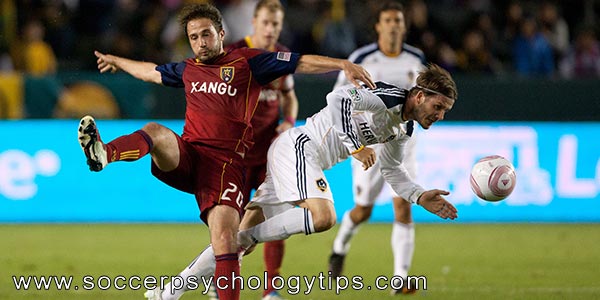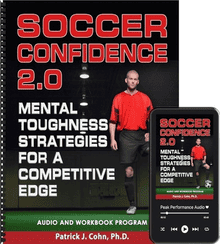
How to Cope With Doubts After Injury
Injuries are challenging for soccer players. The mental wear and tear on your body and mind are significant.
Painful rehab, inactivity, and worry can be an emotional burden that can be difficult to bear.
As difficult as being injured can be, getting back into action is often more mentally strenuous.
In our Mental Game of Soccer survey, one soccer player expressed great concern about rebounding from injury and getting back into competitive action.
“How can you stop worrying about injury during the game, and not let it affect your decisions?”
You would think you would be ecstatic getting back in the game. All those long hours of rehabbing, missing out on the camaraderie of being together with your team, sitting on the sidelines and potentially losing your role on the team are legitimate concerns for an injured player.
The hardest component of getting back in the game is fear, in particular, the fear of re-injury.
Fear not only affects your decision making but fear can also lead to re-injury.
Let’s play out the effects of fear on the soccer field…
You missed a couple of months due to a knee injury. You stuck to your rehab regimen and were cleared to return to competition. You slowly eased back into practice for a couple of weeks and feel good, no soreness or pain.
You feel ready and confident about playing again. Your coach tells you he is reinserting you into the lineup as a midfielder and you are ecstatic.
On game day, you feel more nervous than usual. During warm-up, you start panicking, “What if I re-injure my knee?” During the game, you are so afraid to re-injure your knee that your whole body feels tense. To protect yourself, you play very tentatively.
You feel something in your knee, not pain, but your worry increases and you make several mistakes. It feels impossible to concentrate.
Not only does fear of re-injury lead to mistakes and under-performance, it greatly increases the chance of re-injury. When you try to protect the previously injured area, it causes tension, throws off your gait and leads to potential re-injury.
Overcoming the Fear
Overcoming the fear of re-injury requires a two phase plan:
1. Switch your Focus – You have a choice as to what you will focus on during a game. Your choice of focus can either be harmful or helpful. Focus on the fear of re-injury or playing poorly, you increase the chances of playing poorly and the risk of re-injury.
The other option that increases the chances of playing solid soccer and reducing the risk of re-injury is to play freely. Playing freely doesn’t mean playing recklessly but playing instinctively where you are immersed in the action on the field and not overthinking.
2. Relax your Body – Since physical tension is your enemy, you need to learn effective strategies to relax on the field when you get the chance. Taking several deep breaths or shaking out your body can reduce tension in your body.
Be patient with your injury and be fully prepared mentally and physically.
Be ready to counter any doubts your have about returning to play. You want to prepare for the challenges associated with returning to competition.
Related Sports Psychology Articles
- How to Manage a Long-Term Soccer Injury
- How to Cope with The Mental Scars After Injury
- How to Regain Confidence After An Injury
- Subscribe to The Sports Psychology Podcast on iTunes
- Subscribe to The Sports Psychology Podcast on Spotify
Download a free sports psychology report to improve your mental game!
Learn more about our one-on-one mental game coaching.
Boost Confidence in Soccer

“Soccer Confidence 2.0” 3-CD and Workbook program is the most comprehensive mental game program we’ve offered to the public. We’re virtually giving away all our mental game secrets for the incredibly low price of only $197.00 including the free bonuses!
“Soccer Confidence” is a complete brain dump of the TOP NINE mental training sessions we teach our soccer players to help them boost their mental game and improve consistency – from how to mentally prepare for games to performing under pressure to building unstoppable confidence.
